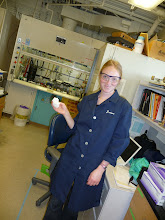Ever wonder where oil comes from? Or how it got there? Or how we get it out of there?
Oil is a "fossil fuel," which basically means it formed from fossils, i.e., the remains of plants/animals that died a very long time ago, most of which ended up at the ocean floor. "But how," you might wonder, "did the animal/plant carcasses get turned into oil just by being dead?"
Over time, layers of sediment formed on top of the animal carcasses and eventually a very hard surface (rock) developed on top of them. Trapped between layers of hard sediment, without any oxygen (an environment in which some microorganisms thrive), the plant and animal material was eaten, metabolized and "broken down" into basic, carbon-rich material, which mixed with the surrounding sediments to form shale. But more plants and animals died, and more rock settled on top of the already present rock, causing significant pressure and heat to build up within the layers of hardness. This caused the oil to boil out in the forms of what we call "crude oil" and "natural gas," which accumulated in other, more suitable locations, such as porous rocks, where it was trapped (by less porous rocks surrounding the more porous rocks).
Although forming the oil and getting it trapped within these rocks was clearly the hard part (oh just hundreds of millions of years or so of Earth doing its thing), getting the oil out is not so easy either. First, we need to know exactly where the oil is. Of course, there are many places all over the Earth where large amounts of oil are trapped. In order to find them, geologists typically send shock waves into the Earth through layers of rock and the reflected waves are analyzed to determine the presence or absence of oil. The reflected waves travel at different speeds, which are characteristic of the particular material through which they traveled.
Once the oil is located, oil drillers (e.g., Chevron) begin developing their plans--after having gained legal right to the land, of course--for drilling. Enter oil rig. Essentially, drill a big hole in the Earth, pump out the oil. A little bit of chemistry interwoven with this messy process, which I'll discuss in due time.





No comments:
Post a Comment